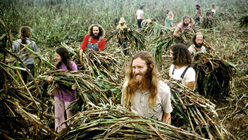The recent spate of documentaries about the environment — from fracking to the honeybee die-off to the consequences of industrial food production to the melting of glaciers — amounts to a kind of proof, in and of itself, of the ratcheting importance of climate change. (Whether you think filmmakers are ahead of the public or bandwagon jumpers, numbers don’t lie.) Significantly, these films don’t aspire to simply inform the viewer of a growing problem or deteriorating condition but are resolutely action-oriented. It has something to do with the urgency of our situation as inhabitants of an overheating planet, of course, but also with the widespread recognition of audiences that objectivity in documentary film is an illusion. Consequently, advocacy films no longer have to pretend they are anything else.
It’s not coincidental that the new crop of environmental docs is the output of younger filmmakers, who’ve focused their ire and impatience on the here and now. So it’s jarring, in a retro way, that local filmmaker Mark Kitchell devotes fully four-fifths of his epic call to environmentalism, A Fierce Green Fire, to events and episodes from the past. Although Kitchell’s decision to take the long view could be seen as a generational thing (he turned 60 last year), it’s more reflective of his longstanding reverence for history.

Berkeley in the Sixties, his Academy Award-nominated 1990 feature doc about the Free Speech Movement, stands as one of the great nonfiction achievements in the American canon. That impassioned and invaluable film benefitted, however, from the tension between two competing views of the student left’s strategies and success (a petulant Todd Gitlin vs. a slew of proud veterans of the antiwar movement). It also dealt with a largely discrete and completed historical chapter; most crucially, the Vietnam War was long over.
A Fierce Green Fire, in contrast, arrives with the outcome of the fight still in doubt. The environmental movement has accomplished no permanent, certain or inviolable victories, that is, as long as Earth’s survival is jeopardized by human activity. Indeed, when the film finally turns its full attention to the present — or near present, for there was no way to include last fall’s Superstorm Sandy and its “contribution” to the climate-change discussion — and shocks and spooks us with the limited amount of time we have left to head off catastrophic global warming, it relegates all of the environmental movement’s achievements moot. And from a viewer’s (or movie reviewer’s) perspective, it undercuts everything that’s preceded it. If the situation demands our immediate attention, why have we been fiddling for an hour and a half while the planet burns?



